外研版(2019)选择性必修第四册Unit 2 Lessons in life Developing ideas Reading 课件(共32张PPT)
文档属性
| 名称 | 外研版(2019)选择性必修第四册Unit 2 Lessons in life Developing ideas Reading 课件(共32张PPT) | 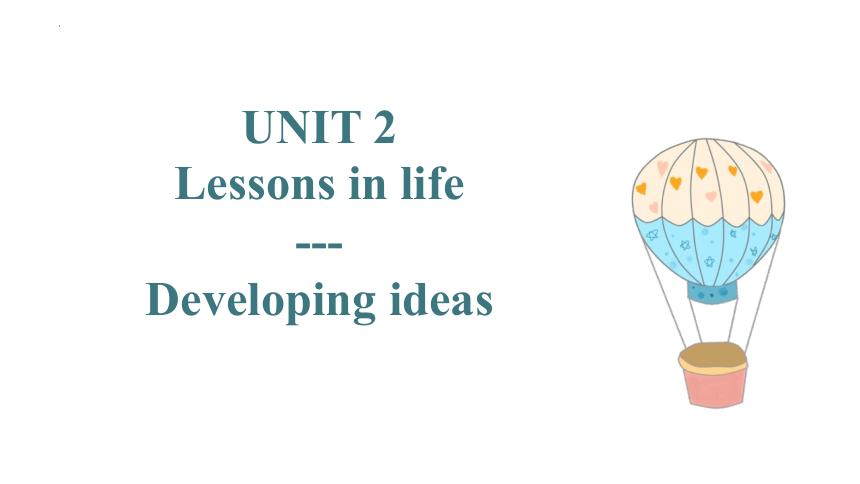 | |
| 格式 | zip | ||
| 文件大小 | 1.2MB | ||
| 资源类型 | 教案 | ||
| 版本资源 | 外研版(2019) | ||
| 科目 | 英语 | ||
| 更新时间 | 2023-04-24 03:12:05 | ||
图片预览

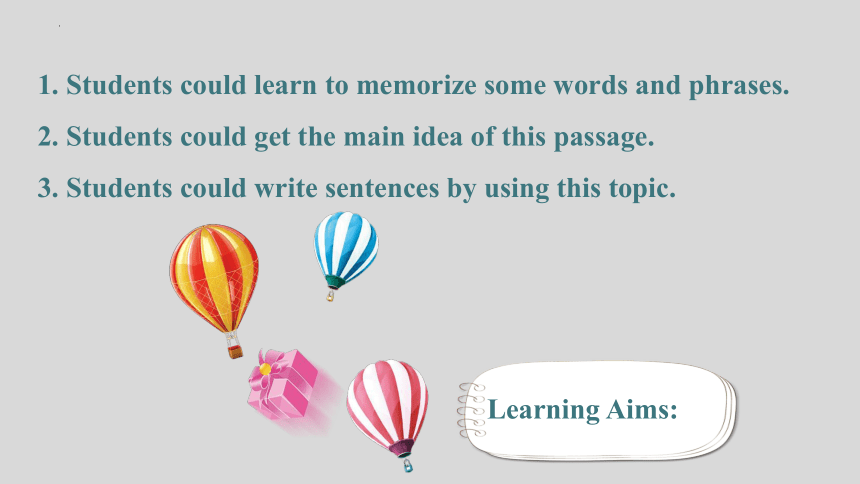
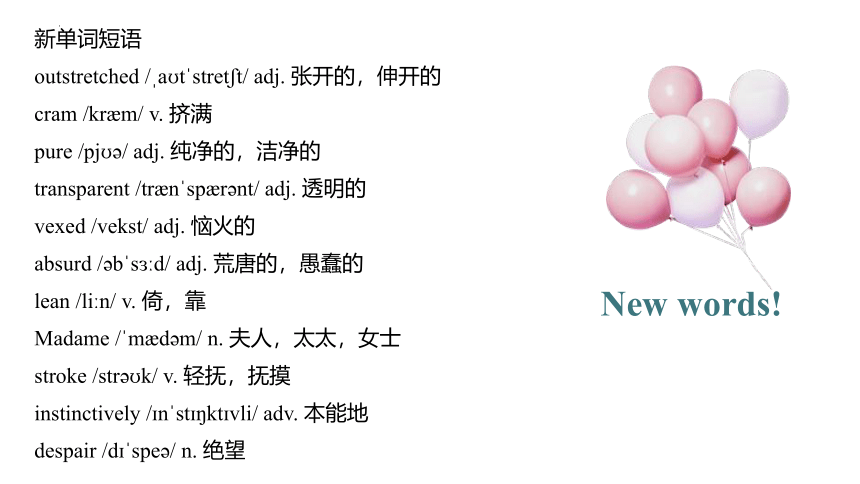
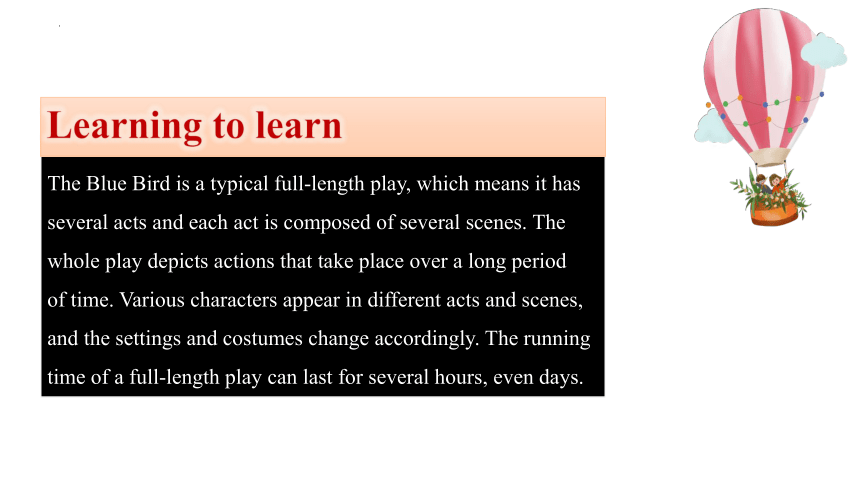
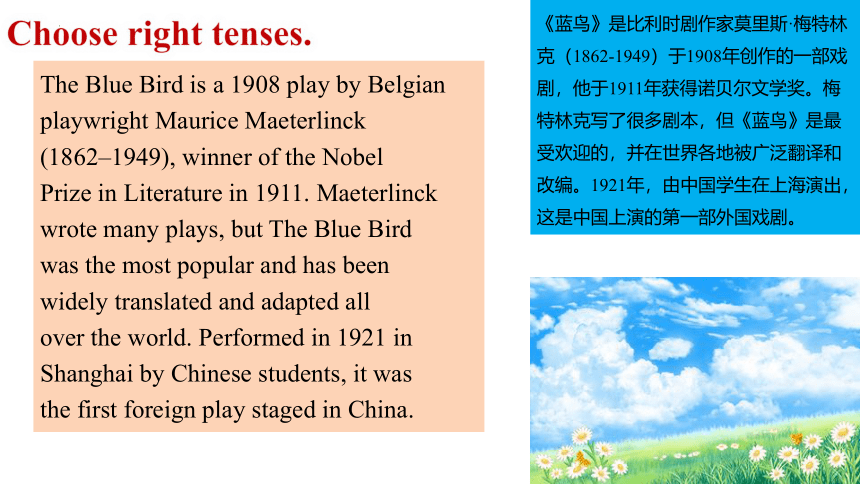
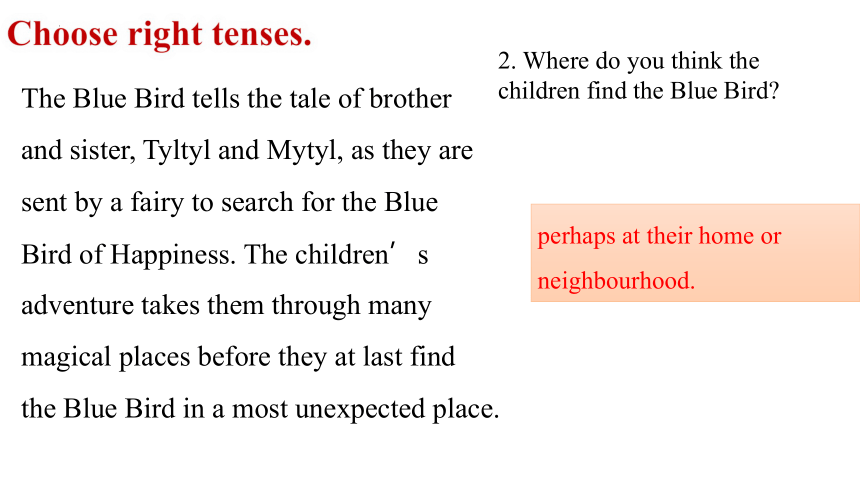
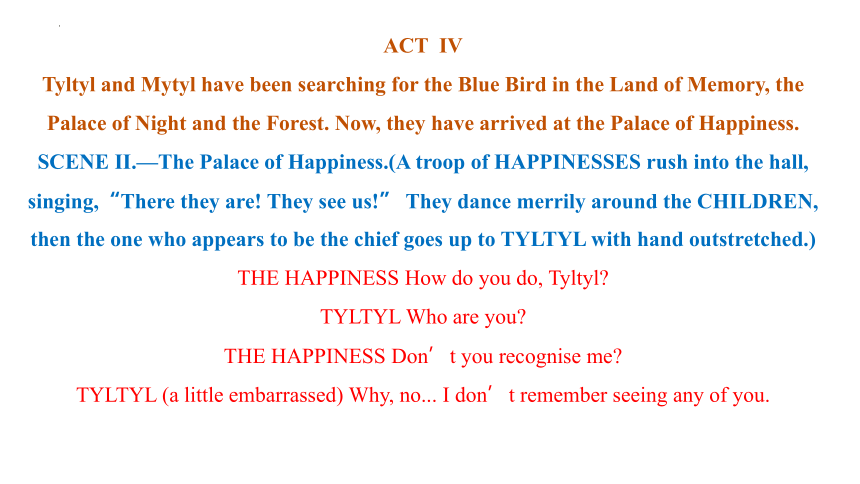
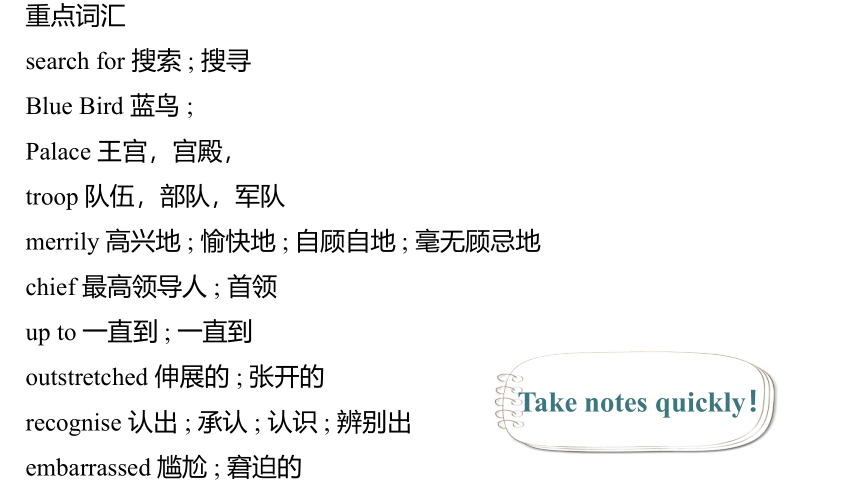
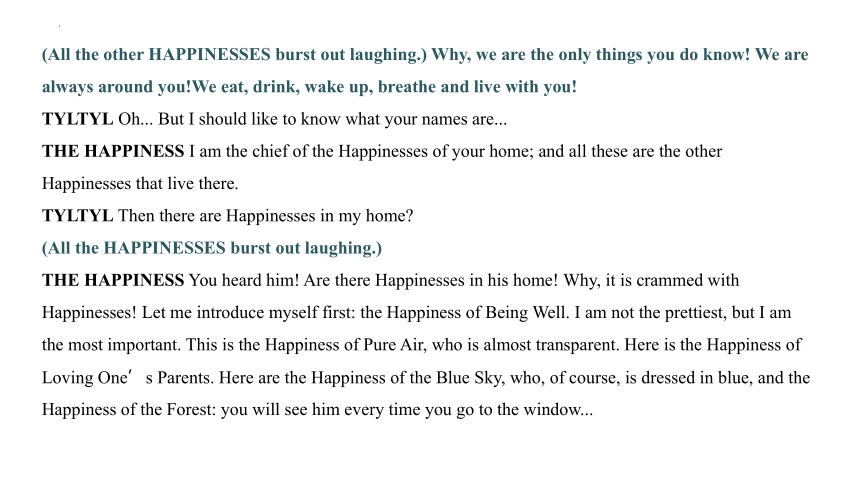
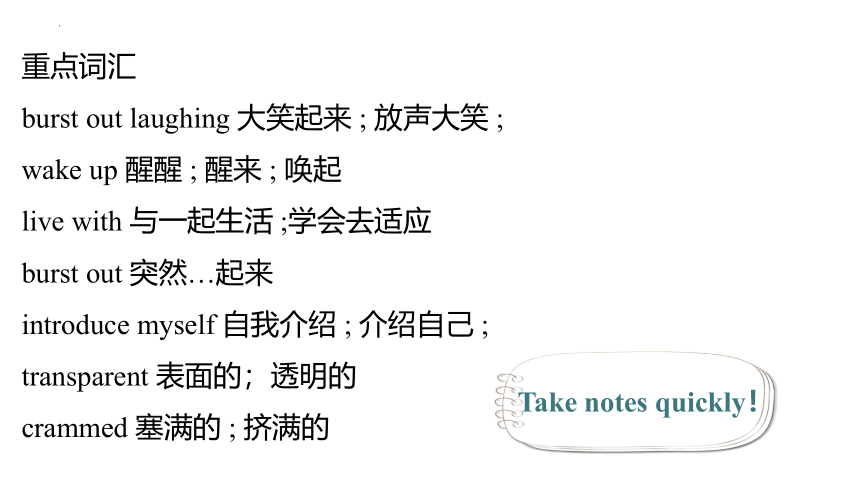
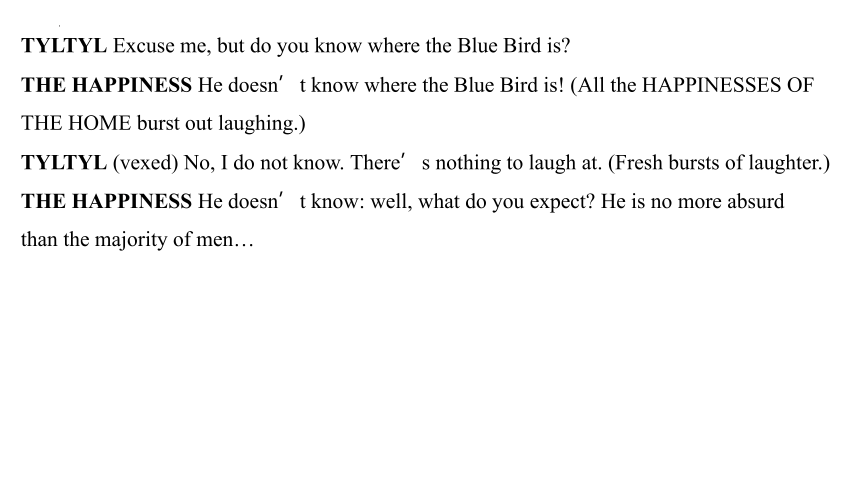
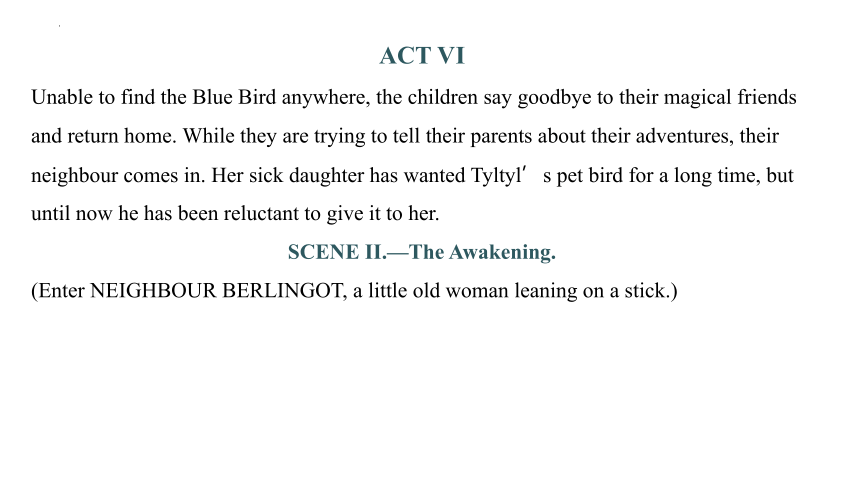
文档简介
(共32张PPT)
UNIT 2
Lessons in life
---
Developing ideas
1. Students could learn to memorize some words and phrases.
2. Students could get the main idea of this passage.
3. Students could write sentences by using this topic.
Learning Aims:
新单词短语
outstretched / a t stret t/ adj. 张开的,伸开的
cram /kr m/ v. 挤满
pure /pj / adj. 纯净的,洁净的
transparent /tr n sp r nt/ adj. 透明的
vexed /vekst/ adj. 恼火的
absurd / b s d/ adj. 荒唐的,愚蠢的
lean /li n/ v. 倚,靠
Madame / m d m/ n. 夫人,太太,女士
stroke /str k/ v. 轻抚,抚摸
instinctively / n st kt vli/ adv. 本能地
despair /d spe / n. 绝望
New words!
The Blue Bird is a typical full-length play, which means it has
several acts and each act is composed of several scenes. The
whole play depicts actions that take place over a long period
of time. Various characters appear in different acts and scenes,
and the settings and costumes change accordingly. The running
time of a full-length play can last for several hours, even days.
Learning to learn
Choose right tenses.
The Blue Bird is a 1908 play by Belgian
playwright Maurice Maeterlinck
(1862–1949), winner of the Nobel
Prize in Literature in 1911. Maeterlinck
wrote many plays, but The Blue Bird
was the most popular and has been
widely translated and adapted all
over the world. Performed in 1921 in
Shanghai by Chinese students, it was
the first foreign play staged in China.
《蓝鸟》是比利时剧作家莫里斯·梅特林克(1862-1949)于1908年创作的一部戏剧,他于1911年获得诺贝尔文学奖。梅特林克写了很多剧本,但《蓝鸟》是最受欢迎的,并在世界各地被广泛翻译和改编。1921年,由中国学生在上海演出,这是中国上演的第一部外国戏剧。
Choose right tenses.
The Blue Bird tells the tale of brother and sister, Tyltyl and Mytyl, as they are sent by a fairy to search for the Blue Bird of Happiness. The children’s adventure takes them through many magical places before they at last find the Blue Bird in a most unexpected place.
2. Where do you think the children find the Blue Bird
perhaps at their home or neighbourhood.
ACT IV
Tyltyl and Mytyl have been searching for the Blue Bird in the Land of Memory, the Palace of Night and the Forest. Now, they have arrived at the Palace of Happiness.
SCENE II.—The Palace of Happiness.(A troop of HAPPINESSES rush into the hall, singing,“There they are! They see us!” They dance merrily around the CHILDREN, then the one who appears to be the chief goes up to TYLTYL with hand outstretched.)
THE HAPPINESS How do you do, Tyltyl
TYLTYL Who are you
THE HAPPINESS Don’t you recognise me
TYLTYL (a little embarrassed) Why, no... I don’t remember seeing any of you.
重点词汇
search for 搜索 ; 搜寻
Blue Bird 蓝鸟 ;
Palace 王宫,宫殿,
troop 队伍,部队,军队
merrily 高兴地 ; 愉快地 ; 自顾自地 ; 毫无顾忌地
chief 最高领导人 ; 首领
up to 一直到 ; 一直到
outstretched 伸展的 ; 张开的
recognise 认出 ; 承认 ; 认识 ; 辨别出
embarrassed 尴尬 ; 窘迫的
Take notes quickly!
(All the other HAPPINESSES burst out laughing.) Why, we are the only things you do know! We are always around you!We eat, drink, wake up, breathe and live with you!
TYLTYL Oh... But I should like to know what your names are...
THE HAPPINESS I am the chief of the Happinesses of your home; and all these are the other Happinesses that live there.
TYLTYL Then there are Happinesses in my home
(All the HAPPINESSES burst out laughing.)
THE HAPPINESS You heard him! Are there Happinesses in his home! Why, it is crammed with Happinesses! Let me introduce myself first: the Happiness of Being Well. I am not the prettiest, but I am the most important. This is the Happiness of Pure Air, who is almost transparent. Here is the Happiness of Loving One’s Parents. Here are the Happiness of the Blue Sky, who, of course, is dressed in blue, and the Happiness of the Forest: you will see him every time you go to the window...
重点词汇
burst out laughing 大笑起来 ; 放声大笑 ;
wake up 醒醒 ; 醒来 ; 唤起
live with 与一起生活 ;学会去适应
burst out 突然…起来
introduce myself 自我介绍 ; 介绍自己 ;
transparent 表面的;透明的
crammed 塞满的 ; 挤满的
Take notes quickly!
TYLTYL Excuse me, but do you know where the Blue Bird is
THE HAPPINESS He doesn’t know where the Blue Bird is! (All the HAPPINESSES OF
THE HOME burst out laughing.)
TYLTYL (vexed) No, I do not know. There’s nothing to laugh at. (Fresh bursts of laughter.)
THE HAPPINESS He doesn’t know: well, what do you expect He is no more absurd than the majority of men…
ACT VI
Unable to find the Blue Bird anywhere, the children say goodbye to their magical friends and return home. While they are trying to tell their parents about their adventures, their neighbour comes in. Her sick daughter has wanted Tyltyl’s pet bird for a long time, but until now he has been reluctant to give it to her.
SCENE II.—The Awakening.
(Enter NEIGHBOUR BERLINGOT, a little old woman leaning on a stick.)
Take notes quickly!
重点词汇
Unable to do... 无法 做...;不能够
Blue Bird 蓝鸟 ; 青鸟 ; 滨崎步
say goodbye to 向…说再见 ; 承认不会拥有 ; 道别
for a long time 长时间 ; 长久
until now 直到现在 ; 到现在为止,迄今
be reluctant to 不愿意 ; 不情愿的 ; 勉强的
The Awakening 觉醒 ;
Excuse me 对不起,打扰一下
burst out laughing 大笑起来 ;
laugh at 嘲笑 ; 付之一笑
MUMMY TYL How is your little girl
THE NEIGHBOUR Only so-so. She can’t get up. But I know what would cure her.
MUMMY TYL Yes, I know; it’s Tyltyl’s bird. Well, Tyltyl, aren’t you going to give it at last to that poor little thing
TYLTYL My bird! Why, he’s blue! But it’s my turtle-dove! But he’s much bluer than when I went away! Why, that’s the Blue Bird we were looking for! We went so far and he was here all the time! There, Madame Berlingot, take him to your little girl.
THE NEIGHBOUR Really Straight away and for nothing How happy she will be! (Kissing TYLTYL.)
Take notes quickly!
重点词汇
turtle-dove斑鸠
get up 起床,叫…起床,起床 ;
at last 最后 ; 终于
cure 治愈
go away 走开了 ; 离开,逃走
so far 目前为止
all the time 总是,一直
Straight away 马上
for nothing 免费的 ; 无缘无故
(Later, the NEIGHBOUR enters with a little girl who carries TYLTYL’S dove in her arms.)
THE NEIGHBOUR Do you see the miracle She can run, she can dance, she can fly! (Pushing the LITTLE GIRL into TYLTYL’S arms.) Come along and thank Tyltyl.
(After TYLTYL kisses the LITTLE GIRL rather awkwardly, the two children look at each other without speaking; then TYLTYL strokes the dove’s head.)
TYLTYL Is he blue enough
THE LITTLE GIRL Yes, I am so pleased with him.
TYLTYL I have seen bluer ones. But those which are quite blue, you know, do what you will, you can’t catch them.
THE LITTLE GIRL That doesn’t matter; he’s lovely.
TYLTYL Has he had anything to eat I will show you...
Take notes quickly!
重点词汇
enters 进来 ; 进去 ;
miracle 圣迹,神迹 ; 奇迹
Come along 过来 ; 一起去 ; 一起来 ; 跟我来
awkwardly 笨拙地;难看地;无技巧地
each other 彼此,互相
strokes 击球 ; 一下,一击
be pleased with 对...感到满意
matter 课题
(He moves to take the bird from the LITTLE GIRL’S hands. She resists instinctively; and, in their hesitation, the DOVE escapes and flies away.)
THE LITTLE GIRL (with a cry of despair) He is gone!
TYLTYL Never mind. Don’t cry. I will catch him again. (Stepping to the front
of the stage and addressing the audience.) If any of you should find him, would you be so very kind as to give him back to us We need him for our happiness, later on.
CURTAIN
(Adaptation from The Blue Bird by Maurice Maeterlinck)
What is the characters in ACT IV SCENE II
Tyltyl, (Mytyl,) a troop of Happinesses, the Happiness
What is the setting of this story in ACT IV SCENE II
Tyltyl and Mytyl have been searching for theBlue Bird in the Land of Memory. Now they have arrived at
the Palace of Happiness. A troop of Happinesses
rush into the hall and speak to them.
there are Happinesses in his home, and at this moment, all the Happinesses burst out laughing. The chief of the Happinesses tells him that his home is filled with Happinesses. The chief introduces himself to Tyltyl as the Happiness of Being Well, and then introduces him to other Happinesses: of Pure Air, of Loving One’s Parents, of the Blue Sky and of the Forest. Tyltyl just wants to ask the Happinesses one thing: the whereabouts of the Blue Bird.
What is the plot of this story in ACT IV SCENE II
Tyltyl, (Mytyl,) Mummy Tyl, the neighbour Berlingot, the little girl
What is the characters in ACT VI SCENE II
What is the setting of this story in ACT VI SCENE II
Unable to find the Blue Bird anywhere, the children return home. While they are trying to tell their parents about their adventures, their neighbour comes in. She is asking for Tyltyl’s bird for her sick little girl.
Why cannot Tyltyl recognise any of the Happinesses
Because he doesn’t realise the fact that the Happinesses are all around him in his home.
3. What does the author want to express by making the Blue Bird fly away at the end of the play
By making the Blue Bird fly away at the end of the play, the author wants to tell us great happiness is not based on material things, but a more meaningful, spiritual joy and that giving and sharing sometimes mean the true happiness.
Writing a summary
The Blue Bird is a six-act fairy play written by Maurice Maeterlinck. It’s a story about Tyltyl and Mytyl’s adventures as they search for the Blue Bird of Happiness. As the children of a poor woodcutter, they are secretly observing a party at the home of their wealthy landlords when a fairy appears. She uses a magic diamond to bring animals (their dog and cat), objects (sugar and bread) and elements (light, fire, water) in their home to life. Together, they set off on a dangerous journey in search of the Blue Bird.
search for 搜索
woodcutter 伐木工
secretly 秘密地 ;
a party 一方
landlords 业主 ; 地主 ;
set off 动身,出发
in search of 寻找
Tyltyl and Mytyl go to many magical places. They encounter numerous characters such as their departed grandparents, trees that hate mankind, the greedy and ugly Luxuries, and children waiting to be born. Although they try very hard to find the Blue Bird, the birds they find either change colour or die. The children return home at last, and Tyltyl discovers the Blue Bird has been there all the time! He gives the bird to the neighbour’s little girl, curing her illness. But in the end, the bird flies away, and Tyltyl asks the audience to search for it. The central idea of the play is that happiness is to be found not in luxuries such as wealth, but in simple things that are found in family life, and in acts of friendship and kindness.
What is the theme of the play
happiness is to be found not in luxuries such as wealth, but in simple things that are found in family life, and in acts of friendship and kindness.
When writing a summary of a long story, your purpose is to convey the basic ideas of the original: what is it about and what does the
author want to communicate First, identify the title and author of the piece. Then use your own words to describe relevant details that lead to the climax of the story. State the central idea of the story but don’t give your own opinion of it. A good summary needs to be concise, precise and to the point.
Learning to learn
重点词汇
summary 摘要
convey 传达 ; 输送
lead to 导致 ; 通向
climax 高潮 ; 顶点
central idea 中心思想
concise 简明的
precise 准确的
Do you know the symbolic meaning of the Blue Bird in Chinese and Western cultures Share with the class.
It symbolises happiness and it brings good luck and health to people in Western cultures, while in Chinese culture the Blue Bird symbolises the messenger.
Now think about how well you used concise and precise language to
summarise the play and what you could do to improve.
Try to talk your ideas with others
1.
2.
3.
Thank you!
UNIT 2
Lessons in life
---
Developing ideas
1. Students could learn to memorize some words and phrases.
2. Students could get the main idea of this passage.
3. Students could write sentences by using this topic.
Learning Aims:
新单词短语
outstretched / a t stret t/ adj. 张开的,伸开的
cram /kr m/ v. 挤满
pure /pj / adj. 纯净的,洁净的
transparent /tr n sp r nt/ adj. 透明的
vexed /vekst/ adj. 恼火的
absurd / b s d/ adj. 荒唐的,愚蠢的
lean /li n/ v. 倚,靠
Madame / m d m/ n. 夫人,太太,女士
stroke /str k/ v. 轻抚,抚摸
instinctively / n st kt vli/ adv. 本能地
despair /d spe / n. 绝望
New words!
The Blue Bird is a typical full-length play, which means it has
several acts and each act is composed of several scenes. The
whole play depicts actions that take place over a long period
of time. Various characters appear in different acts and scenes,
and the settings and costumes change accordingly. The running
time of a full-length play can last for several hours, even days.
Learning to learn
Choose right tenses.
The Blue Bird is a 1908 play by Belgian
playwright Maurice Maeterlinck
(1862–1949), winner of the Nobel
Prize in Literature in 1911. Maeterlinck
wrote many plays, but The Blue Bird
was the most popular and has been
widely translated and adapted all
over the world. Performed in 1921 in
Shanghai by Chinese students, it was
the first foreign play staged in China.
《蓝鸟》是比利时剧作家莫里斯·梅特林克(1862-1949)于1908年创作的一部戏剧,他于1911年获得诺贝尔文学奖。梅特林克写了很多剧本,但《蓝鸟》是最受欢迎的,并在世界各地被广泛翻译和改编。1921年,由中国学生在上海演出,这是中国上演的第一部外国戏剧。
Choose right tenses.
The Blue Bird tells the tale of brother and sister, Tyltyl and Mytyl, as they are sent by a fairy to search for the Blue Bird of Happiness. The children’s adventure takes them through many magical places before they at last find the Blue Bird in a most unexpected place.
2. Where do you think the children find the Blue Bird
perhaps at their home or neighbourhood.
ACT IV
Tyltyl and Mytyl have been searching for the Blue Bird in the Land of Memory, the Palace of Night and the Forest. Now, they have arrived at the Palace of Happiness.
SCENE II.—The Palace of Happiness.(A troop of HAPPINESSES rush into the hall, singing,“There they are! They see us!” They dance merrily around the CHILDREN, then the one who appears to be the chief goes up to TYLTYL with hand outstretched.)
THE HAPPINESS How do you do, Tyltyl
TYLTYL Who are you
THE HAPPINESS Don’t you recognise me
TYLTYL (a little embarrassed) Why, no... I don’t remember seeing any of you.
重点词汇
search for 搜索 ; 搜寻
Blue Bird 蓝鸟 ;
Palace 王宫,宫殿,
troop 队伍,部队,军队
merrily 高兴地 ; 愉快地 ; 自顾自地 ; 毫无顾忌地
chief 最高领导人 ; 首领
up to 一直到 ; 一直到
outstretched 伸展的 ; 张开的
recognise 认出 ; 承认 ; 认识 ; 辨别出
embarrassed 尴尬 ; 窘迫的
Take notes quickly!
(All the other HAPPINESSES burst out laughing.) Why, we are the only things you do know! We are always around you!We eat, drink, wake up, breathe and live with you!
TYLTYL Oh... But I should like to know what your names are...
THE HAPPINESS I am the chief of the Happinesses of your home; and all these are the other Happinesses that live there.
TYLTYL Then there are Happinesses in my home
(All the HAPPINESSES burst out laughing.)
THE HAPPINESS You heard him! Are there Happinesses in his home! Why, it is crammed with Happinesses! Let me introduce myself first: the Happiness of Being Well. I am not the prettiest, but I am the most important. This is the Happiness of Pure Air, who is almost transparent. Here is the Happiness of Loving One’s Parents. Here are the Happiness of the Blue Sky, who, of course, is dressed in blue, and the Happiness of the Forest: you will see him every time you go to the window...
重点词汇
burst out laughing 大笑起来 ; 放声大笑 ;
wake up 醒醒 ; 醒来 ; 唤起
live with 与一起生活 ;学会去适应
burst out 突然…起来
introduce myself 自我介绍 ; 介绍自己 ;
transparent 表面的;透明的
crammed 塞满的 ; 挤满的
Take notes quickly!
TYLTYL Excuse me, but do you know where the Blue Bird is
THE HAPPINESS He doesn’t know where the Blue Bird is! (All the HAPPINESSES OF
THE HOME burst out laughing.)
TYLTYL (vexed) No, I do not know. There’s nothing to laugh at. (Fresh bursts of laughter.)
THE HAPPINESS He doesn’t know: well, what do you expect He is no more absurd than the majority of men…
ACT VI
Unable to find the Blue Bird anywhere, the children say goodbye to their magical friends and return home. While they are trying to tell their parents about their adventures, their neighbour comes in. Her sick daughter has wanted Tyltyl’s pet bird for a long time, but until now he has been reluctant to give it to her.
SCENE II.—The Awakening.
(Enter NEIGHBOUR BERLINGOT, a little old woman leaning on a stick.)
Take notes quickly!
重点词汇
Unable to do... 无法 做...;不能够
Blue Bird 蓝鸟 ; 青鸟 ; 滨崎步
say goodbye to 向…说再见 ; 承认不会拥有 ; 道别
for a long time 长时间 ; 长久
until now 直到现在 ; 到现在为止,迄今
be reluctant to 不愿意 ; 不情愿的 ; 勉强的
The Awakening 觉醒 ;
Excuse me 对不起,打扰一下
burst out laughing 大笑起来 ;
laugh at 嘲笑 ; 付之一笑
MUMMY TYL How is your little girl
THE NEIGHBOUR Only so-so. She can’t get up. But I know what would cure her.
MUMMY TYL Yes, I know; it’s Tyltyl’s bird. Well, Tyltyl, aren’t you going to give it at last to that poor little thing
TYLTYL My bird! Why, he’s blue! But it’s my turtle-dove! But he’s much bluer than when I went away! Why, that’s the Blue Bird we were looking for! We went so far and he was here all the time! There, Madame Berlingot, take him to your little girl.
THE NEIGHBOUR Really Straight away and for nothing How happy she will be! (Kissing TYLTYL.)
Take notes quickly!
重点词汇
turtle-dove斑鸠
get up 起床,叫…起床,起床 ;
at last 最后 ; 终于
cure 治愈
go away 走开了 ; 离开,逃走
so far 目前为止
all the time 总是,一直
Straight away 马上
for nothing 免费的 ; 无缘无故
(Later, the NEIGHBOUR enters with a little girl who carries TYLTYL’S dove in her arms.)
THE NEIGHBOUR Do you see the miracle She can run, she can dance, she can fly! (Pushing the LITTLE GIRL into TYLTYL’S arms.) Come along and thank Tyltyl.
(After TYLTYL kisses the LITTLE GIRL rather awkwardly, the two children look at each other without speaking; then TYLTYL strokes the dove’s head.)
TYLTYL Is he blue enough
THE LITTLE GIRL Yes, I am so pleased with him.
TYLTYL I have seen bluer ones. But those which are quite blue, you know, do what you will, you can’t catch them.
THE LITTLE GIRL That doesn’t matter; he’s lovely.
TYLTYL Has he had anything to eat I will show you...
Take notes quickly!
重点词汇
enters 进来 ; 进去 ;
miracle 圣迹,神迹 ; 奇迹
Come along 过来 ; 一起去 ; 一起来 ; 跟我来
awkwardly 笨拙地;难看地;无技巧地
each other 彼此,互相
strokes 击球 ; 一下,一击
be pleased with 对...感到满意
matter 课题
(He moves to take the bird from the LITTLE GIRL’S hands. She resists instinctively; and, in their hesitation, the DOVE escapes and flies away.)
THE LITTLE GIRL (with a cry of despair) He is gone!
TYLTYL Never mind. Don’t cry. I will catch him again. (Stepping to the front
of the stage and addressing the audience.) If any of you should find him, would you be so very kind as to give him back to us We need him for our happiness, later on.
CURTAIN
(Adaptation from The Blue Bird by Maurice Maeterlinck)
What is the characters in ACT IV SCENE II
Tyltyl, (Mytyl,) a troop of Happinesses, the Happiness
What is the setting of this story in ACT IV SCENE II
Tyltyl and Mytyl have been searching for theBlue Bird in the Land of Memory. Now they have arrived at
the Palace of Happiness. A troop of Happinesses
rush into the hall and speak to them.
there are Happinesses in his home, and at this moment, all the Happinesses burst out laughing. The chief of the Happinesses tells him that his home is filled with Happinesses. The chief introduces himself to Tyltyl as the Happiness of Being Well, and then introduces him to other Happinesses: of Pure Air, of Loving One’s Parents, of the Blue Sky and of the Forest. Tyltyl just wants to ask the Happinesses one thing: the whereabouts of the Blue Bird.
What is the plot of this story in ACT IV SCENE II
Tyltyl, (Mytyl,) Mummy Tyl, the neighbour Berlingot, the little girl
What is the characters in ACT VI SCENE II
What is the setting of this story in ACT VI SCENE II
Unable to find the Blue Bird anywhere, the children return home. While they are trying to tell their parents about their adventures, their neighbour comes in. She is asking for Tyltyl’s bird for her sick little girl.
Why cannot Tyltyl recognise any of the Happinesses
Because he doesn’t realise the fact that the Happinesses are all around him in his home.
3. What does the author want to express by making the Blue Bird fly away at the end of the play
By making the Blue Bird fly away at the end of the play, the author wants to tell us great happiness is not based on material things, but a more meaningful, spiritual joy and that giving and sharing sometimes mean the true happiness.
Writing a summary
The Blue Bird is a six-act fairy play written by Maurice Maeterlinck. It’s a story about Tyltyl and Mytyl’s adventures as they search for the Blue Bird of Happiness. As the children of a poor woodcutter, they are secretly observing a party at the home of their wealthy landlords when a fairy appears. She uses a magic diamond to bring animals (their dog and cat), objects (sugar and bread) and elements (light, fire, water) in their home to life. Together, they set off on a dangerous journey in search of the Blue Bird.
search for 搜索
woodcutter 伐木工
secretly 秘密地 ;
a party 一方
landlords 业主 ; 地主 ;
set off 动身,出发
in search of 寻找
Tyltyl and Mytyl go to many magical places. They encounter numerous characters such as their departed grandparents, trees that hate mankind, the greedy and ugly Luxuries, and children waiting to be born. Although they try very hard to find the Blue Bird, the birds they find either change colour or die. The children return home at last, and Tyltyl discovers the Blue Bird has been there all the time! He gives the bird to the neighbour’s little girl, curing her illness. But in the end, the bird flies away, and Tyltyl asks the audience to search for it. The central idea of the play is that happiness is to be found not in luxuries such as wealth, but in simple things that are found in family life, and in acts of friendship and kindness.
What is the theme of the play
happiness is to be found not in luxuries such as wealth, but in simple things that are found in family life, and in acts of friendship and kindness.
When writing a summary of a long story, your purpose is to convey the basic ideas of the original: what is it about and what does the
author want to communicate First, identify the title and author of the piece. Then use your own words to describe relevant details that lead to the climax of the story. State the central idea of the story but don’t give your own opinion of it. A good summary needs to be concise, precise and to the point.
Learning to learn
重点词汇
summary 摘要
convey 传达 ; 输送
lead to 导致 ; 通向
climax 高潮 ; 顶点
central idea 中心思想
concise 简明的
precise 准确的
Do you know the symbolic meaning of the Blue Bird in Chinese and Western cultures Share with the class.
It symbolises happiness and it brings good luck and health to people in Western cultures, while in Chinese culture the Blue Bird symbolises the messenger.
Now think about how well you used concise and precise language to
summarise the play and what you could do to improve.
Try to talk your ideas with others
1.
2.
3.
Thank you!
